Dr. Biscet and members of the Lawton Foundation protest death penalty and use of Rivanol in front of the hospital Calixto Garcia in Havana, Cuba Dr. Oscar Elias Biscet Gonzalez, 43 years old, president of the Lawton Human Rights Foundation, has been detained over two dozen times in the past. In one instance, he served a three year sentence.
Dr. Biscet and Migdalia Rosado denounce the murders of Carlos, Armando, Pablo, and Mario shotdown in international airspace by Cuban MiGs on 2/24/96 He was released on 10/31/2002 from a maximum security prison and gave a press conference denouncing prison conditions. On 12/6/2002 Dr. Biscet was re-detained with 16 other dissidents after they attempted to meet at a home in Havana to discuss human rights. Even though he was kept in detention since December, Dr. Biscet was tried together with the dissidents arrested in March 2003 and sentenced to 25 years in prison. He is an Amnesty International prisoner of conscience.
To love one's neighbor is also to love one's enemy. Although in reality that qualifier-"enemy" does not exist in my vocabulary. I recognize that I only have adversaries and I have acquired the capacity to love them because in this way we do away with violence, wrath, vengeance, hatred and substitute them with justice and forgiveness
- Dr. Oscar Elias Biscet Gonzalez,upon completing a 40 day fast in 1999 to protest the 40th anniversary of dictatorship
Human Rights Violations in Cuba
In Cuba, any journalist who does not work for the official media is considered to be an “enemy of the state†or a “mercenaryâ€. The changeover at the summit of the state between the Castro brothers and the promises made by Cuba in relation to human rights at the Non-Aligned Summit in Havana have unfortunately done nothing to alter this state of affairs. There are currently 24 of them who have paid with their freedom for having founded an independent news agency, written for a dissident review or spoken to a media in the Cuban diaspora.From Updated information on imprisoned Cuban journalists / Reporters Without Bordershttp://www.rsf.org/rubrique.php3?id_rubrique=367In 2005, more people were arrested and given disproportionate sentences for expressing dissident political opinions. The appeal to the Cuban authorities made by the Personal Representative of the High Commissioner on 28 July 2005 has gone unanswered. The Personal Representative of the High Commissioner has drawn up 10 recommendations intended to put an end to the current situation through restoration of the guaranteed fundamental rights of citizens in the country and international protection of those rights through Cuba’s accession to the International Covenant on Civil and Political Rights, as well as its two optional protocols and the International Covenant on Economic, Social and Cultural Rights.From UN COMMISSION ON HUMAN RIGHTS: Sixty-second session Situation of human rights in Cuba Report submitted by the Personal Representative of the High Commissioner for Human Rights, Christine Chanet GE.06-10309 (E) 260106 030206
http://daccessdds.un.org/doc/UNDOC/GEN/G06/103/09/PDF/G06103 09.pdf?OpenElementOn 25 February 1996, the Inter-American Commission on Human Rights (hereinafter “the Commission†or “the Inter-American Commissionâ€) received several complaints brought against the Republic of Cuba (hereinafter “the State,†“the Cuban State,†or “Cubaâ€) according to which a MiG-29 military aircraft belonging to the Cuban Air Force (FAC) downed two unarmed civilian light airplanes belonging to the organization “Brothers to the Rescue.â€[1] According to a report issued by the International Civil Aviation Organization (ICAO), the incidents occurred on 24 February 1996 at 3:21 p.m. and 3:27 p.m., respectively, in international airspace. The air-to-air missiles fired by the MiG-29 destroyed the civilian light aircraft, immediately killing Armando Alejandre Jr. (45 years old), Carlos Alberto Costa (29), Mario Manuel de la Peña (24), and Pablo Morales (29).REPORT Nº 86/99 CASE 11.589 ARMANDO ALEJANDRE JR., CARLOS COSTA, MARIO DE LA PEÑA, AND PABLO MORALES vs. CUBA
September 29, 1999
http://www.cidh.org/annualrep/99eng/Merits/Cuba11.589.htm"On July 19, 1994, the Inter-American Commission on Human Rights received a complaint stating that in the early morning hours of July 13, 1994, four boats belonging to the Cuban State and equipped with water hoses attacked an old tugboat that was fleeing Cuba with 72 people on board. The incident occurred seven miles off the Cuban coast, opposite the port of Havana. The complaint also indicates that the Cuban State boats attacked the runaway tug with their prows with the intention of sinking it, while at the same time spraying everyone on the deck of the boat, including women and children, with pressurized water. The pleas of the women and children to stop the attack were in vain, and the old boat--named "13 de Marzo"--sank, with a toll of 41 deaths, including ten minors. Thirty-one people survived the events of July 13, 1994. "REPORT Nº 47/96 CASE 11.436 VICTIMS OF THE TUGBOAT "13 DE MARZO" vs. CUBA
October 16, 1996
http://www.cidh.org/annualrep/96eng/Cuba11436.htmCuba Verdad: Human Rights in Cuba.
http://www.cubaverdad.org/CUBA'S REPRESSIVE MACHINERY
Human Rights Forty Years After the Revolution
http://www.hrw.org/reports/1999/cuba/Cubanet
http://www.cubanet.org/Movimiento Sindical Independiente
http://www.cubanet.org/sindical/sindical.htmlHuman Rights Violations prior to 2001 in Cuba Archive
http://www.fiu.edu/~fcf/humrts.html
